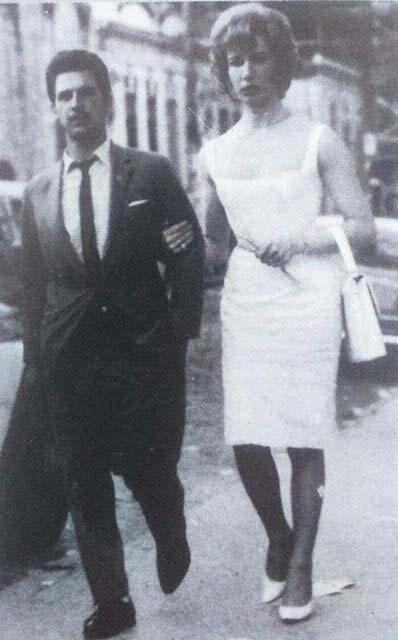Galiaci grew up São Paulo state, in the village of Bocaina which at that time had only 10 streets. Father was a cattle drover. At age seven Galiaci attempted suicide after considering that he might be a ‘viado’ (similar to ‘queer’). The school mates and others did treat Galiaci as such, who was afraid that the father would find out. When Galiaci was 14, he did so, threatened his son with a machete, and then threw both mother and child out of the house. Young Galiaci was in the city of São Paulo the next day.
 |
| Jacqueline & Antonio |
She was arrested several other times. After the military coup in 1964, she was raped by four agents from the Departamento de Ordem Política e Social (DOPS), the Brazilian secret police. She tried filing a habeas corpus petition to be allowed to walk the streets in women's clothing. Journalist José Magalhães published an article in the magazine Fatos e Fotos claiming that Jacqueline had had a surgical sex change. This news was a scandal, but it was a lie. She hadn't had it yet. Yet.
Jacqueline was registered with the Order of Musicians as an actress and singer. Through the 1960s she performed in all the concert halls of São Paulo, and many others across Brazil. She was written about in the press. Antonio often travelled across Brazil with her.
Finally in 1969 she went to Casablanca, to Dr Burou for completion surgery. She found the experience very painful, but one thing was certain in her mind: it was either that or die. Thus she was the first known Brazilian to have transgender surgery. This was two years before the first surgery in Brazil itself, that on Waldirene Nogueir by Dr Roberto Farina.
After a trip to Paris, Jacqueline returned to São Paulo in December just after the death of Artur da Costa e Silva (Brazil's seventh president and the second of the military regime), and the airport was swarming with military. Jacqueline was recognised, they told her she couldn't be dressed as a woman, and she was arrested. A female police officer took her into a room and checked inside her panties. The officer then reported that Jacqueline was indeed a woman. For a while there was confusion, but then Jacqueline was released.
On television, gay fashion designer Clodovil Hernades, known for his inappropriate comments about other people, said on the Flávio Cavalcanti show that Galiaci was neither a man nor a woman. She demanded a public retraction. She had a good lawyer, Giulio Bartolucci, and through him was able to gain the addition of 'Jacqueline' in the margin of her birth registration. The Magistrate authorized both this and the registration of her female sex.
Jacqueline’s love with Antonio lasted 32 years. She discontinued her stage career, and became one of the most respected breeders of Chihuahua dogs in São Paulo. “I have puppies in Germany, Italy, Bolivia, the United States, Portugal, in the hands of the consul of the USSR, in the family of General Couto e Silva, Nelson Gonçalves, Biro-Biro, etc,” she was quoted.
She died in 1992, age 58, of a heart attack, just after being interviewed by the Brasilian edition of Marie Claire magazine. She had exclusively granted Marie Claire two testimonials and an unpublished memoir.
Jacqueline's entry was deleted from the PT.Wikipedia in 2008, for no good reason.
-
Adriano Fernandes Ferreira. Transexual como sujeito passivo de crime contra a liberdade: sexual: estupro ou atentado violento ao pudor. http://www.diritto.it/archivio/1/20258.pdf, 10.
-
“Transexuais estranhos no próprio corpo”. Marie Claire, 1993. Copy Online.
-
Neto Lucon & Astrid Beatriz Bodstein. “Conheça a Emocionante História de Jacqueline Galiaci, a 1ª brasileira transexual a passar pela redesignação genital” Identidade Mandacaru, 9 de marco de 2017. Online
-
“Transcestrality, Travestiland, Traviarchy: the stage and gender dissidences in Brazil”. www.scielo.br, 2024. Online.

No comments:
Post a Comment
Comments that constitute non-relevant advertisements will be declined, as will those attempting to be rude. Comments from 'unknown' and anonymous will also be declined. Repeat: Comments from "unknown" will be declined, as will anonymous comments. If you don't have a Google id, I suggest that you type in a name or a pseudonym.